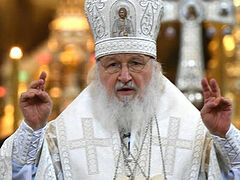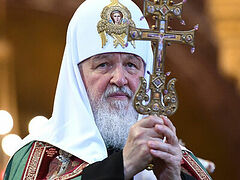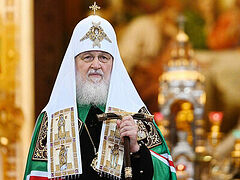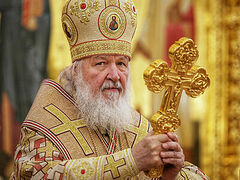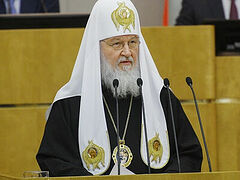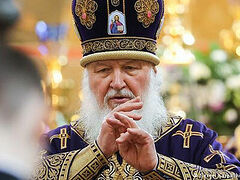A couple of weeks ago, the Canadian government imposed sanctions against Patriarch Kirill of Moscow and All Russia. Archbishop Gabriel (Chemodakov) of Montreal and Canada, in his interview with Pravoslavie.ru, spoke about how the Russian Church Outside Russia (ROCOR) considers such a move and addressed the speculations about them leaving the Moscow Patriarchate.
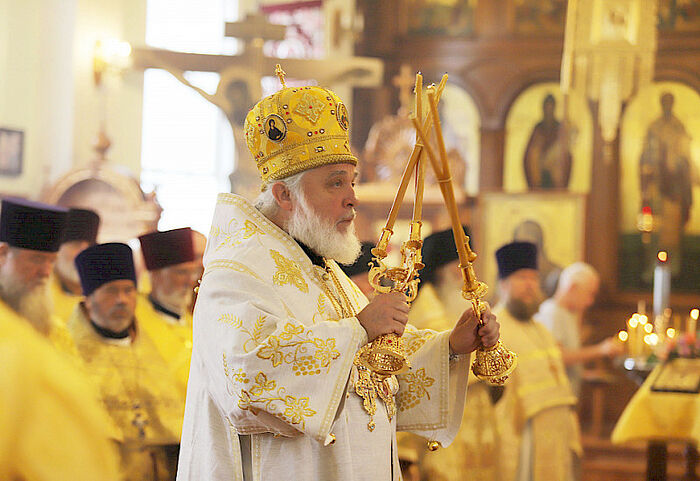 Photo credit by: ww.unification.com.au
Photo credit by: ww.unification.com.au
—Vladyka, how would you describe the Canadian government's decision to impose sanctions against Patriarch Kirill?
—In a word, I would say this is ridiculous, just like the sanctions of the United Kingdom previously imposed on the Patriarch. I would say that they make no sense whatsoever. The Patriarch is the head of the Church, he has his own opinion, and I don’t understand why the authorities in the Western countries politicize this issue. However, all this corresponds to the Russophobia that currently holds sway over the West.
We have freedom of religion, and we are free to commemorate during the services whomever we see fit
—Will this decision by the Canadian authorities affect your diocese or the Russian Orthodox Church Outside Russia as a whole?
—I hope not. We continue to believe that in Canada, the church is separate from the state, we have freedom of religion and are free to commemorate anyone we see fit during the services. In a given case, we recognize Patriarch Kirill as the head of the Russian Orthodox Church and recognize his authority. I hope that no action will be taken in this regard and we will be able to continue to exercise our faith freely, as in any democratic country.
—Nevertheless, the fact remains: This is already the second country that has imposed sanctions against the Patriarch and the list may grow. Will the Russian Orthodox Church Outside Russia, with the majority of the parishes located in countries that introduce restrictions on Russia, continue to commemorate the Patriarch during its services?
—I will reiterate: We are going to commemorate the Patriarch as the head of the Church. His Holiness is a citizen of his country and has the right to express his position. In my opinion, it is natural that he supported the President of the Russian Federation and the Russian armed forces who defend the interests of Russia and the Russian-speaking residents of Donbass who, even to this day, are subject to attacks by the Ukrainian military. I think one would hardly expect him to take a different stance than the one he has taken. We have no reason to cease commemorating him.
—Is this in spite of the attitude of a particular archbishop or a priest toward the events currently taking place?
—Yes. Naturally, at the beginning of the war, and even later, there were cases when several clergymen expressed their concern in this regard, because they had a lot of Ukrainian nationals among their parishioners who asked to stop commemorating the Patriarch—not permanently, but for the time being. Such requests came up in several dioceses of the Russian Orthodox Church Outside Russia, but I have to say they can be counted on one hand. Our Synod responded that no, we must continue to commemorate, and we shouldn’t politicize the issue of our church unity and subordination. The most important thing for us is to pray, strive to keep the peace in a parish, and instruct those who probably expressed their concerns as to why we have to mention the name of the head of the Church during the services of which we are part.
—There are probably more Ukrainians in Canada than in other countries. How do people in your parishes feel about this?
—Despite the fact that we do have many natives of Ukraine, not a single one of our thirty or so parishes had issued such a request. Unfortunately, there were situations where people left our parishes and went to the Ukrainian church. But in most cases the priests, thank God, were able to reassure the flock and explain that we must maintain prayer and church unity, that the Patriarch did not say anything terrible, as some might think. He defends the interests of both Russia and the Church.
The Church has supported military action anytime the defense of the Motherland was at stake
It must be emphasized that at every service we pray for the cessation of the hostilities, so that peace between the brotherly peoples is restored. The Church should concentrate on the fulfillment of the Gospel commandments. But there were times—and so many times throughout the history of Russia—when the Church supported military action anytime the issue was defending the Motherland. Russia was forced to take steps to protect itself from the neo-Nazis who were shelling civilians in Donbass for eight years, and continue to this day.
—In principle, how are the relationships between your diocese and the Canadian authorities? Can one call them respectful?
—There is practically no relationship. But when at the beginning of the special military operation our parish in Montreal and I received personal threats, the police took it quite seriously, and we are grateful for the protection they gave us. Thirty police officers, as well as SWAT forces, ensured the security of our service on Pascha. Thanks be to God, everything went peacefully then; but the threats kept coming afterwards, and our law enforcement took it very seriously again. As far as we know, they located and interrogated someone who could be involved in making such threats. I haven't heard anything about the results of that interrogation, but since then the situation has calmed down. God willing, those who made those threats have realized that the police relate to them in all seriousness.
—In August 1991, Patriarch Alexiy II anathematized the GKChP coup. This time around, many people on every side were probably waiting for the same reaction from Patriarch Kirill. What is your opinion on that?
—Patriarch Alexiy anathematized those who staged the coup, and, at that time, the Church thought it was necessary to defend the existing government. In the USSR the Church supported the state, even though the authorities actively and brutally persecuted it. Such an approach, which we have called “Sergianism”, was one of the reasons for the discord between the Russian Orthodox Church Outside Russia and the Moscow Patriarchate. For us in the West, it was unacceptable.
As for the current situation, the West favors an expression that Russia’s invasion of Ukraine was “unprovoked.” In reality, it is a distortion of the truth; Russia took such measures to protect the Russian-speaking residents of Donbass who were under fire for eight years. Had the US or another Western country ended up in such a position, they would have taken exactly the same steps and no one would have condemned them here. And, in my view, it would have been odd if the Patriarch anathematized the authorities of his country in the given case. Much less in view of those boys who fight defending Russia.
Sure, we could talk about anathematizing the Ukrainian nationalists who for many years were killing peaceful citizens, but they anathematized themselves. They don’t act in a Christian way, but at the instigation of demonic powers—there is no other way to call that absolutely barbaric, reckless nationalism they profess.
—There were reports in the media that the Synod of the Russian Orthodox Church Outside Russia held at the end of June was going to consider leaving the Russian Orthodox Church. As far as I know, it was not even a part of the agenda. Is such a step possible in principle, or is it not even being considered?
Our unity is not up for discussion
—It is absolutely untrue; I don't even know where such information could come from. In fact, we didn’t have such a discussion in principle. Even the hierarchs who, to a greater or lesser extent, opposed the special military operation, didn’t raise the issue of breaking Eucharistic communion with the Moscow Patriarchate. Our unity is not up for discussion, and there will be no such discussion at the upcoming Council of Bishops in September.
—Can the position of the ROCOR regarding unity with the Moscow Patriarchate or any other key issues change significantly depending on who will be elected as the new First Hierarch at this said Sobor?
—I think that regardless who is elected, it will not change our position on the issue of unity. Even if a hierarch who speaks negatively about the situation in Ukraine becomes our First Hierarch, I don't think he will be able to influence the entire Synod enough to even initiate the discussion of a possible withdrawal. I think it isn’t only unlikely, but, as you might say, practically impossible.

